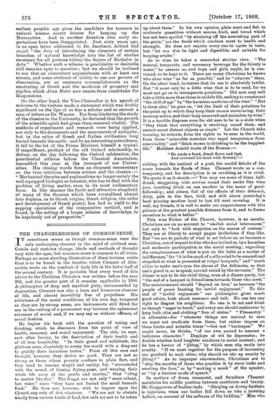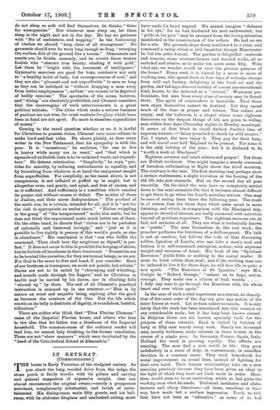THE CHANGELESSNESS OF COMMON-SENSE.
IT sometimes seems as though common-sense were the only unchanging element in the mind of civilised man. Creeds and customs change, ideals and methods of thought
vary with the ages, but common-sense is common to all times. Perhaps no more startling illustration of these truisms exists
than is to be found in the treatise which Clement of Alex- andria wrote on the conduct of daily life in the latter half of the second century. It is probable that every word of this advice to the Christian Churches was written before the year 202, and the greater part of it remains applicable in 1908. A philosopher of deep and mystical piety, untrammelled by dogmatism, Clement was also a keen and humorous observer of life, and almost incredibly free of prejudices. His criticisms of the social conditions of his own day, tempered as they are by strong sense, are instruments still fitted for use in the cutting of a permanent way between the ephemeral extremes of social and, if we may say so without offence, of moral fashion.
He begins his book with the question of eating and drinking, which he discusses from the point of view of health, economy, and social enjoyment. The rich, he says, seek after luxury, to the destruction of their health and of all true hospitality. "In their greed and solicitude, the gluttons seem absolutely to sweep the world with a drag-net to gratify their luxurious tastes." From all this care and thought, however, they derive no good. They are not so strong as those whom poverty confines to plain fare, and they tend to become stupid and earthy, for, "surrounded with the sound of hissing frying-pans, and wearing their whole life away at the pestle and mortar," they "cling to matter like fire." The frugal are not only "more robust, but wiser," since "they have not buried the mind beneath food." He does not, however, wish to impose upon the Church any rule of diet whatever. "We are not to abstain wholly from various kinds of food, but only are not to be taken up about them." In his own opinion, plain meat and fish in moderate quantities without sauces, fruit, and bread which has not been spoiled "by straining off the nourishing part of the grain," are the foods which conduce most to health and strength. He does not require every one to agree in taste, but "let our diet be light and digestible, and suitable for keeping awake."
As to wine he takes a somewhat stricter view. "The natural, temperate, and necessary beverage for the thirsty is water," he assures us, and boys and girls might, be is con- vinced, to be kept to it. There are many Christians he knows who shun wine "as far as possible," and he " admires " them. On the other hand, be insists that its use is absolutely lawful. But "it must only be a little wine that is to be used, for we must not go on to intemperate potations." Old men may well take a little more than those in middle life, seeking to counteract "the chill of age" by "the harmless medicine of the vine." "But to them also," he goes on, "let the limit of their potations be the point up to which they keep their reason unwavering, their memory active, and their body unmoved and unshaken by wine." It is a terrible disgrace even for old men to be in a state when "they think that everything is revolving round them, and cannot count distant objects as single." Let the Church take warning, he exhorts, from the sights to be seen in the world, from those "miserable wretches who expel temperance from conviviality," and "think excess in drinking to be the happiest life." Matthew Arnold wrote of the Roman :— a He made a feast, drank fierce and fast, And crowned his head with flowers,"—
sinking, with the instinct of a poet, the sordid details of the scene beneath the goods of time. Clement wrote as a con- temporary, and his description is as revolting as it is vivid.
We quote it as it stands :—" You may see some of them, half- drunk, staggering, with crowns round their necks like wine jars, vomiting drink on one another in the name of good- fellowship ; and others, full of the effects of their debauch, dirty, pale in the face, livid, and still above yesterday's bout pouring another bout to last till next morning. It is well, my friends, it is well to make our acquaintance with this picture at the greatest possible distance from it, and to frame ourselves to what is better."
This wise Father of the Church, however, is no ascetic. Christians are on no account to "abolish social intercourse," but only to "look with suspicion on the snares of custom." They are at liberty to accept pagan invitations if they like. But "we are to partake of what is set before us, as becomes a Christian, out of respect to him who has invited us, by a harmless and moderate participation in the social meeting ; regarding the sumptuousness of what is put on the table us a matter of indifference," for "it is the mark of a silly mind to be amazed and stupefied at what is presented at vulgar banquets," and" much sillier to make one's eyes the slaves of the delicacies, so that one's greed is, so to speak, carried round by the servants." The dinner is not to be the chief thing, even at a dinner-party, but "the end of a banquet is friendliness towards those who meet." The entertainment should "depend on love," as becomes "the people of peace feasting for lawful enjoyment." To this end of "lawful enjoyment" our philosopher gives much good advice, both about manners and talk. No one has any right to disgust his neighbour. No one is to eat and drink as though "eager to burst," and every one should endeavour to keep both chin and clothing" free of stains." " Pleasantry " is allowable—for "whatever things are natural to men we must not eradicate from them, but rather impose on them limits and suitable times "—but not "burlesque." We ought never, he thinks, "of our own accord to assume a ludicrous character." Displays of wit he deprecates; he doubts whether loud laughter conduces to social content; and be has a horror of "jibing," by which men slip easily into cruelty. "If we meet together for the purpose of increasing our goodwill to each other, why should we stir up enmity by jibing ? " As to improper conversation, Christians are to "stop the mouths of those who practise it by stern looks and averting the face," or by "making a mock" of the speaker, or "by a harsher mode of speech."
In matters of dress, ornament, and furniture Clement maintains his middle position between asceticism and lnxin'y. He disapproves of feather-beds. "Sleeping on downy feathers is injurious, when our bodies fall down as into a yawning hollow, on account of the softness of the heading." ' Men who
do not sleep so .soft will find themselves, he thinks, "fitter for emergenoies." But whatever men sleep on, let them Bleep in the night and not in the day. He has no patience with "fits of uselessness, and napping." In the fashioning of clothes we should "keep clear of all strangeness." No garments should ever be worn long enough to drag, "sweeping the surface dirt of the ground like a broom." Ornaments and scents are, he thinks, unmanly, and he counts those women foolish who " obscure true beauty, shading it with gold." Let them be "bright with the ornament of intelligence." Gymnastic exercises are good for boys, conducive not only to "a healthy habit of body, but courageousness of soul," and they are also "pleasant and not unprofitable" to men so long as they can be indulged in "without dragging a man away from better employments "; neither " are women to be deprived of bodily exercise." The spectacles of the arena, however, , and "dicing" are absolutely prohibited, and Clement considers
• that the encouraging of such entertainments is a great political mistake. "The cities which make a serious business of pastime are not wise, for cruel contests for glory which have been so fatal are not sport. No more is senseless expenditure of money."
Coming to the vexed question whether or no it is lawful for Christians to possess riches, Clement once more refuses to make hard-and-fast rules. He shows plainly, as does every writer in the New Testament, that his sympathy is with the poor. It is "monstrous," be exclaims, "for one to live in luxury while many are in want," and "that which is squandered on foolish lusts is to be reckoned waste, not expendi- ture." He detests ostentation. ' " Simplicity," he says, "pro- idea for sanctity, by reducing redundancies to equality, and by furnishing from whatever is at hand the enjoyment sought from superfluities. For simplicity, as the name shows, is not conspicuous, is not inflated or puffed up in aught, but is altogether even, and gentle, and equal, and free of excess, and so is sufficient. And sufficiency is a condition which reaches its proper end without excess or defect. The mother of these is Justice, and their nurse Independence." The product of the earth was, be is certain, intended for all, and it is "not for the rich to appropriate an undue share." "Riches wriggling in the grasp" of "the inexperienced" make him smile, but he does not think the experienced make much better use of them. On the other band, he directs that "riches are to be partaken of rationally and bestowed lovingly," and "just as it is possible to live rightly in penury of this world's goods, so also in abundance." His conclusion is that "one who fulfils the command, • Thou shalt love thy neighbour as thyself,' is per- fect." It does not occur to him to prohibit the keeping of slaves, but he forbids all harshness in their treatment. "Domestics are to be treated like ourselves, for they are human beings, as we are. For God is the same to free and bond, if you consider. Such of our brethren as transgress, we must not punish, but rebuke." Slaves are not to be called by "chirruping and whistling, and sounds made through the fingers," and no Christian in health may be carried by his slaves, nor in climbing hills "shoved up" by them. The end of all Clement's practical instruction is summed up in one sentence :—" Man is by nature an erect and majestic being, aspiring after the good as becomes the creature of the One. But the life which crawls on its belly is destitute of dignity, is scandalous, hateful, ridiculous."
There are critics who think that "Titus Flavius Clemens" came of the Imperial Flavian house, and others who lean to the idea that his father was a freedman of the Imperial household. The common-sense of the ordinary reader will lead him, we cannot help thinking, to the former conclusion. These are not "slave manners" which were inculcated by the "head of the Catechetical School at Alexandria."















































 Previous page
Previous page